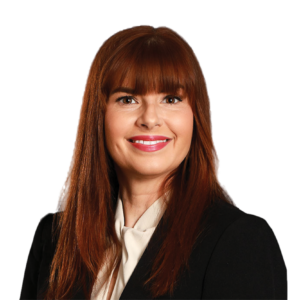
Always Changing – Always Evolving
Fennemore?s Health Care Leader, Heather Macre, Is The Perfect Person For A Practice Group That Continually Shifts With The Health Care Landscape
Always Changing – Always Evolving
As we spring into April, our focus now turns to the health care sector, an area already rapidly changing due to a huge wave of boomers impacting the system – and now obviously under the scrutiny of the public’s microscope over a year into a worldwide pandemic.
We recently spoke with Heather Macre, head of Fennemore’s health care litigation and regulation practice group during these tumultuous times for the healthcare industry.
April is “National Interprofessional Healthcare Month,” which focuses on the necessity of collaboration by multiple disciplines in the healthcare industry, so it’s only fitting that we should be talking with you now. What should a physician, practice group or hospital know about your group?
Healthcare law changes frequently and those changes can impact your ability to practice or create new ways to structure your business. We handle all sorts of matters – HIPAA/HITECH, Stark Law, Anti-Kickback and False Claims Act compliance, board complaints, licensing, etc. – and we can help you set your practice on a course to success or help when there are legal threats. The group is also multi-disciplinary, so we can manage issues outside of the realm of healthcare law as well. In short, we handle business and compliance concerns so that physicians can get back to what they love – treating patients.
What attracted you to the business litigation healthcare sector – and what would you tell an attorney considering working in this practice area?
I started my legal career doing commercial litigation and bankruptcy. Doing that showed me that I really enjoy working in the regulatory realm. I worked on several matters that involved healthcare law issues and it whet my appetite for this work. I was also fortunate to be in a firm with a healthcare attorney and I asked him if I could assist. He was very generous with his time and helped me find classes and meetings to increase my skills.
I really enjoy working in a space where I feel like I can make a difference. I can help healthcare professionals do their job and, hopefully, increase access to care. For example, seeing that the COVID pandemic was going to disproportionately impact the elder care/congregate care environment, I proactively positioned myself as a thought leader in the industry, often hearing that I was one of the only voices offering both legal and practical advice on this issue. I authored a series of articles and webinars targeting the industry with tips on best practices, managing outbreaks, handling questions from relatives and preventing the spread. I presented to both firm clients, the public and to industry groups, providing regular updates on new developments from the CDC, OSHA and the Arizona Department of Health Services, among others. I helped participants keep up with the fast-changing regulatory landscape to keep the most vulnerable people safe. I continue to work directly with clients to minimize the impact of COVID on several elder care communities.
I would tell new attorneys that like the healthcare space itself, healthcare law is always changing and evolving. This discipline offers you the opportunity to help those who care for us and like them, you always need to keep up with the changes in the law and in technology. If you have an interest in health and medicine, and you are willing to work in a fast-evolving area of the law, healthcare law is for you.
Name the mentor who made the greatest impact on your career – or the hero of your own life?
Joe Schenk! As I mentioned above, he had a healthcare practice and when I became interested in this practice, he really took the time to teach and mentor me. He introduced me to clients and pushed me to try new things. I have been incredibly lucky to work with a gifted advocate who is also a great person and friend. Even better, I still get to work with him every day here at Fennemore!
Lawyers get stereotyped – and we’ve all heard the tired clichés and jokes, but Fennemore is actually filled with a number of artists and musicians, and very creative individuals, like you. How does an art history major and a performer end up in law school?
I was working on art history projects abroad, and came back to deal with a family situation. At that time, I realized that I needed to do something that would allow me to support myself and be more stable. Since I am not great at math, I picked law school. Years later, it was clearly a good choice.
I think that having an art background can help you be a successful lawyer. Art history helped me to think creatively and to apply different perspectives. Being a performer prepared me for being in court where anything can happen. In addition, I have several creative outlets/hobbies that help me de-stress after practicing law all week.
What are you currently reading?
Why Fish Don’t Exist: A Story of Loss, Love, and the Hidden Order of Life by Lulu Miller
Tell us about that one failure that you still remember – and what did you learn from it?1
This isn’t a failure, per se, but it was a huge setback – when my last firm, Aiken Schenk, broke up. I was on the management committee for the firm and it just was not going to stay viable as people left and retired. It felt like a failure that I was not able to hold it all together. I was worried about my career and the 40 or so other people we employed.
I landed at Fennemore and over a year later, I have learned a lot. I learned that making connections and acting professionally and collegially at all time is so important. My connections helped me find a new firm and place my entire team. Lots of people reached out to help and I am eternally grateful to them.
I also learned that change can be good. I had gotten comfortable at AS and I have been able to stretch and grow at Fennemore.
What would you tell your younger self?
People do not think about you as much as you think they do. I really wish I spent less time worrying what others think of me and developing my own quirky interests. As Elsa says, we should just, “Let it go.”
You’re also an elected official, and many attorneys go on to careers in politics. As President of the United States, what’s the first Executive Order that you’d sign into action on your first day on the job?
Equal pay, for real and for everyone. Men, women and people of color would all be compensated the exact same across all jobs and industries.
We salute Heather Macre, and all of the remarkable healthcare professionals – many who work on the frontlines of our current pandemic – who continue to make significant contributions to this critical sector. To learn more about Heather’s practice, especially physicians, practice groups and hospitals seeking guidance, please visit our healthcare practice group.
[1] As “The Simpsons” taught us: You tried. You failed. What did you learn? Never try.
Get MORE. Insights
Stay ahead in the legal world - subscribe now to receive the latest insights and news from Fennemore Law Directly in your inbox!

